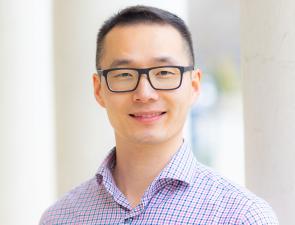Data Analytics & AI
Faculty in the Department of Mechanical and Aerospace Engineering at the University of Virginia are advancing research at the intersection of data analytics, artificial intelligence (AI), and engineering applications. Their work encompasses the application of machine learning and Bayesian inference to accelerate the discovery of novel materials, including 2D materials and metallic alloys. In smart manufacturing, researchers are integrating adaptive control and machine learning techniques to enhance efficiency and sustainability, while also exploring human-robot collaboration. In biomechanics, computational modeling and data analysis are employed to improve safety in automotive and sports contexts, with efforts focused on injury biomechanics and vehicle crashworthiness. Additionally, the department is leveraging high-performance computing and AI to develop advanced computational fluid dynamics algorithms for complex aerospace and mechanical systems. These interdisciplinary initiatives underscore the department's commitment to utilizing data-driven approaches to address complex engineering challenges.
Core Faculty
Stephen Baek
Stephen Baek is an Associate Professor of Data Science at the University of Virginia, where he also holds a courtesy appointment in the Department of Mechanical and Aerospace Engineering.

Prasanna Balachandran
My interests are in materials informatics, density functional theory, machine learning, bayesian inference, and optimal design methods applied to accelerate the search and discovery of novel 2D materials, metallic alloys, ferroic and electronic materials.


Prior to joining UVA as an Associate Professor in 2012, Dr. Dong was an associate professor of Mechanical Engineering at the Wright State University. He obtained his Ph.D. degree in Aerospace Engineering from UCLA in 2003. After completing his doctorate, he spent three years as a post-doctoral researcher at the George Washington University.

Jason Forman
Jason Forman's research includes the development and biofidelity evaluation of anthropomorphic test devices, the execution of impact biomechanics in simulated automobile environments, the development of injury risk functions with dummies and computational models, analysis for injury risk evaluation, and investigating the effects on injury risk.

Gregory J. Gerling
My research interests span the fields of haptics, computational neuroscience, biomechanics, human–machine interaction, UX/UI, and human factors and ergonomics. We investigate cutaneous and proprioceptive cues that convey an object’s softness, and neural and biomechanical bases of social and emotional touch, and soft tissue manipulation or massage.

Xinfeng Gao's research is focused on the development of high-performance computing (HPC) computational fluid dynamics (CFD) algorithms for a wide range of applications in aerospace and mechanical engineering, involving shock waves, turbulence, combustion, plasma, and multifluids.

Jason R. Kerrigan
Prof. Kerrigan's research in injury biomechanics uses data analysis, computational modeling, and mechanical experiments with human tissue to prevent and mitigate injuries to motor vehicle occupants and athletes. Right now he is working on occupant protection for future vehicles, shoe-turf interaction mechanics, and characterizing injury tolerance.

Matthew B. Panzer
Dr. Panzer is the Associate Dean for Graduate Education and Post-Doctoral Affairs for the School of Engineering and Applied Sciences, a Professor of Mechanical & Aerospace Engineering and Biomedical Engineering at the University of Virginia, and the Deputy Director at the Center for Applied Biomechanics.

Baoxing Xu
Dr. Xu joined the Department of Mechanical and Aerospace Engineering at The University of Virginia in the fall of 2014. He received his PhD in Mechanics and Materials from Columbia University in 2012 and was a Beckman Postdoctoral Fellow at the University of Illinois at Urbana-Champaign from 2012 to 2014.

